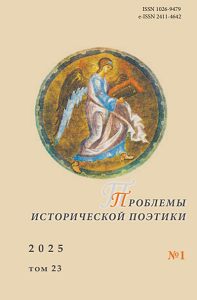Поэтика сказки М. Е. Салтыкова-Щедрина «Чижиково горе»
Poetics of “Chizhikov’s Grief”, a Fairy Tale by M. E. Saltykov-Shchedrin
Author(s): Marina A. AlyakrinskayaSubject(s): Christian Theology and Religion, Studies of Literature, Comparative Study of Literature, French Literature, Russian Literature, Ukrainian Literature, British Literature, Sociology of Literature
Published by: Петрозаводский государственный университет
Keywords: Mikhail Saltykov-Shchedrin; fairy tale; French naturalism; Emile Zola; Christmas Story; Easter Story; Nikolai Gogol; Charles Dickens; A Christmas Carol;
Summary/Abstract: The article examines the fairy tale by M. E. Saltykov-Shchedrin “Chizhikov’s Grief.” Up until now, researchers have not taken into account certain significant circumstances when interpreting “Chizhikov’s Grief.” First of all, it is the unusual love and family theme of the tale, which is not characteristic of Saltykov-Shchedrin’s work (moreover, it was repeatedly criticized by him as ‘outdated’); and, secondly, the publication of the tale in the Christmas issue of “Russkie Vedomosti,” which provides reason to consider its text within the “Christmas story” tradition. The theme of love and family and the peculiarities of the poetics of “Chizhikov’s Grief” suggest that the fairy tale contains elements of intertextuality: it “refers” the reader, on the one hand, to the tradition of the naturalistic novel popular in the 1870s - 1880s, and on the other hand - to the Christmas stories by Ch. Dickens. M. E. Saltykov was critical of naturalist writers, opposing them to Ch. Dickens and N. V. Gogol. This contradiction is reflected in the structure of “Chizhikov’s Grief,” where the first part of the tale contains elements of parody of the naturalistic novel’s poetics (i.e., in E. Zola’s work), and the second part resembles the plot model of Dickens’s “Christmas Carol” (the transformation of the “misanthropic hero” who travels the path with “guilt-correction-redemption” as the key milestones). Analyzing the poetics of “Chizhikov’s Grief” allows to understand the author’s concept of the fairy tale: critically comparing the “earthiness” of the naturalist writers and the “idealism” of Ch. Dickens and N. V. Gogol, M. E. Saltykov-Shchedrin emphasizes the importance of the ideal component of private life. The problem of love and marriage is resolved in “Chizhikov’s Grief” in the style of the Christmas (Easter) tradition: sublime love revives the dead soul of the hero, while in the tale’s open ending the only positive variant of conflict resolution is the heroes’ acquisition of Christian values: forgiveness and love. Thus, behind the numerous literary contexts, irony and satire, the tale conceals a moral absolute that’s distinctive to the national consciousness; and this absolute was the personal position of M. E. Saltykov-Shchedrin.
Journal: Проблемы исторической поэтики
- Issue Year: 23/2025
- Issue No: 1
- Page Range: 165-187
- Page Count: 23
- Language: Russian

